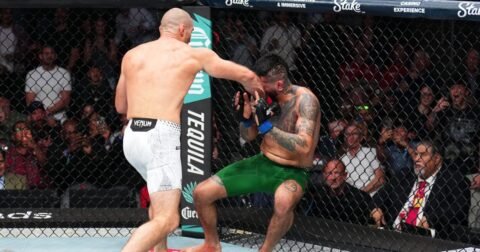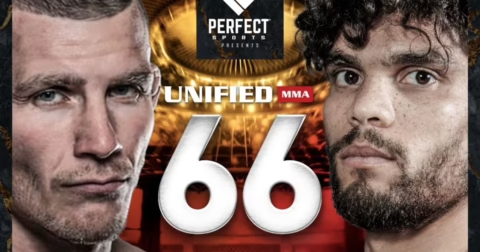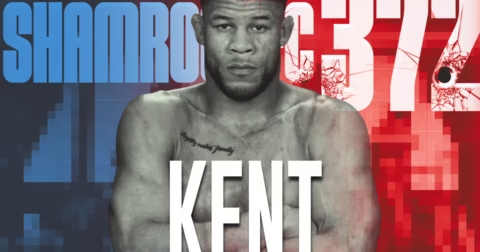In the world of mixed martial arts, transitioning to the UFC often signifies a financial breakthrough for fighters. However, Paddy Pimblett’s journey tells a different story. The rising star, who previously thrived as a two-division champion in Cage Warriors, faced an unexpected pay cut upon joining the UFC in 2021. His experience sheds light on the intricacies of fighter contracts and the sacrifices made in pursuit of success in this fiercely competitive sport.
The Transition from Cage Warriors to UFC: A Financial Shift
Paddy Pimblett’s move from Cage Warriors to the UFC in 2021 marked a pivotal point in his career, but not without financial challenges. Surprisingly, instead of reaping the rewards typically expected while transitioning to the world’s premier MMA promotion, Pimblett experienced a pay decrease. His previous deal with Cage Warriors far surpassed what he earned in his early UFC fights, highlighting a contrast in the pay dynamics between different levels of promotions in the MMA landscape. Many fighters strive for the opportunity to showcase their skills in the UFC, often dreaming of lucrative contracts that promise significant financial rewards, yet Pimblett’s narrative challenges the notion that UFC contracts are always more lucrative from the outset.
During his time in Cage Warriors, Pimblett carved out a successful career, becoming a two-division champion, which certainly played a role in his previous earnings. His decision to join the UFC came with hopes of elevated status and larger financial gains in the long run. However, he faced a common yet unfortunate reality in MMA: champions in smaller promotions often receive higher salaries that don’t immediately translate to the UFC pay structure. Despite this initial setback, Pimblett’s confidence in his abilities and potential allowed him to strategically negotiate improvements in his contract after proving himself in the octagon.
Understanding UFC Fighter Pay Structure
The UFC pay structure is a crucial factor that defines how much fighters earn, and it is typically determined by a base salary along with win bonuses. For many fighters, a standard deal may start at around $10,000 to show and an additional $10,000 for a victory. However, as Paddy Pimblett found out, not all fighters start at the same point, and some may even find themselves negotiating lower terms when beginning their UFC careers. This pay model can be disheartening for newcomers who might have already established a strong financial foundation in other promotions, such as Cage Warriors.
Moreover, the UFC’s compensation is also influenced by fighters’ marketability, fan engagement, and performance records. Successful fighters often secure sponsorship deals that supplement their incomes significantly. For Pimblett, despite his initial lower pay, he acknowledged the importance of building his brand and fanbase. His marketability could lead to improved financial opportunities with future contracts and sponsorships, making it crucial for UFC newcomers to navigate their career paths wisely and capitalize on their performance and persona inside and outside the cage.
Paddy Pimblett’s Evolving UFC Contract Details
Paddy Pimblett’s evolving UFC contract details are significant, especially following his recent negotiation for a new deal set to take effect at UFC 314. As he prepares to face former Bellator champion Michael Chandler, these updates are integral not just to his financial status but also to his future in the promotion. Initially starting with a lower base pay, Pimblett’s successful outings in the octagon have allowed him to negotiate better terms. This development showcases how performance translates to greater financial opportunities, a pivotal aspect that defines many athletes’ careers in mixed martial arts.
With the announcement of a new contract, fans and analysts alike are eager to understand the specifics and implications of Pimblett’s deal. Improved contracts can lead to enhanced sponsorship opportunities, an important revenue stream that many fighters rely on. For someone like Pimblett, whose personality and fighting style have garnered significant attention, these sponsorships could provide an additional financial cushion, especially as he aims to elevate his standing within the UFC. As he continues to climb the ranks, knowing the details of his UFC contract will play a critical role in determining his strategies for securing his financial future.
Sponsorships: An Essential Income Source for MMA Fighters
In the realm of mixed martial arts, sponsorships have become an increasingly essential income source for fighters, often providing financial stability that base salaries from promotions might not match. Paddy Pimblett has recognized this need, capitalizing on his growing popularity to secure lucrative sponsorship deals that help cover living and training expenses. Sponsorships can sometimes exceed fight purse earnings, especially for well-marketed fighters who connect effectively with fans and brands alike.
These additional revenue streams are critical in bridging the financial gaps that fighters may experience during their careers, especially when starting with lower pay structures in promotions like the UFC. For fighters like Pimblett, navigating the sponsorship landscape becomes just as important as preparing for fights. As the fight business continues to evolve, understanding how to leverage personal branding alongside fight performance will be crucial for any fighter looking to maximize their earnings within the sport.
The Role of Cage Warriors in Shaping Fight Careers
Cage Warriors has played a significant role in shaping the careers of many fighters, including Paddy Pimblett, by providing a platform for talent to develop and showcase their skills. The promotion is well-regarded for its competitive bouts and has produced several fighters who later transitioned to the UFC, often taking their developed talents and marketability with them. Fighters who excel in Cage Warriors find themselves not only earning respect within the MMA community but also potentially higher contracts when stepping up to larger promotions.
For Pimblett, his success in Cage Warriors allowed him to secure a higher income prior to his UFC debut, establishing a strong financial and athletic footing. The experience in such a respected organization equips fighters with the necessary skills and exposure that can lead to better opportunities later, including negotiating more favorable UFC contract details. Understanding the importance of these foundational experiences can greatly influence a fighter’s career trajectory and financial outcomes in the competitive world of mixed martial arts.
Future Prospects for Paddy Pimblett in the UFC
As Paddy Pimblett prepares for his upcoming fight and embarks on a new contract with the UFC, the future prospects for this rising star appear bright. Scheduled to face a formidable opponent in Michael Chandler, Pimblett has the opportunity to solidify his place among the elite in the promotion. Winning this high-stakes fight could not only enhance his reputation but also lead to more lucrative contract negotiations and sponsorship deals.
In the rapidly evolving landscape of the UFC, fighters who can create a significant following or demonstrate exceptional skill have better chances of securing higher earnings. For Pimblett, leveraging his personality and fighting style, alongside his recent contract improvements, can pave the way for lasting success in the UFC. As he builds on his past experiences and continues to grow within the promotion, the financial aspects of his journey are likely to reflect his performances and marketability in the octagon.
The Importance of Financial Planning for MMA Fighters
Financial planning is essential for MMA fighters, particularly with the unpredictable nature of fight earnings and career longevity. Paddy Pimblett’s journey highlights the necessity for fighters to manage their finances wisely, especially in the initial stages of their careers where pay structures may not be as lucrative. With athletes earning varying amounts based on fight performance, marketability, and sponsorship opportunities, those who plan ahead stand a better chance of securing their financial future.
Successful fighters often invest their earnings in real estate, businesses, or savings that can provide them with security post-retirement. Pimblett’s recognition of his early earnings from Cage Warriors reflects a commendable approach to financial management. By utilizing his fight purse not just for immediate needs but also for long-term investments, he positions himself to navigate the ups and downs of a fluctuating income stream that characterizes the life of many fighters in mixed martial arts.
Navigating the Competitive World of MMA Contracts
The competitive nature of MMA contracts demands that fighters be astute negotiators and informed about their value in the promotion. Paddy Pimblett’s experience illustrates how understanding contract dynamics and being proactive in negotiations can lead to a more favorable outcome. Many fighters enter deals without comprehending the full implications, which can result in missed opportunities for better pay and benefits in the future.
Fighters like Pimblett, who have proven themselves in earlier promotions, often serve as examples of the significance of strategic contract discussions in MMA. They must consider not just the immediate financial benefits but also how contract terms can affect their marketability and income from sponsorships. By successfully navigating these waters, they can ensure that they make the most out of their fighting careers and secure their financial futures effectively.
| Key Point | Details |
|---|---|
| Paddy Pimblett’s Transition to UFC | Pimblett experienced a pay cut moving from Cage Warriors to UFC. |
| Previous Earnings | His Cage Warriors contract was higher than the initial UFC deal, providing a financial base for his early adulthood. |
| Initial UFC Contract | Had a standard deal of $10,000 to show and $10,000 to win, initially signed for lower amounts ($10,000/12,000). |
| Contract Negotiation | After winning his second fight, Pimblett negotiated a new, increased contract. |
| Upcoming Fight | Scheduled to fight Michael Chandler at UFC 314 in Miami, with a new contract set to take effect. |
| Financial Strategies | Additional sponsorships assist with financial expenses while competing in the UFC. |
Summary
The Paddy Pimblett UFC contract has drawn attention due to his unique financial journey. Unlike many fighters who see a significant pay increase upon joining the promotion, Pimblett took a calculated risk, accepting a reduced salary when he transitioned from Cage Warriors to the UFC. This experience underscores the complex nature of fighter contracts and highlights Pimblett’s strategic financial planning in his early career. As he prepares for his next fight against Michael Chandler at UFC 314, it will be interesting to see how his new contract shapes his future earnings in the sport.







